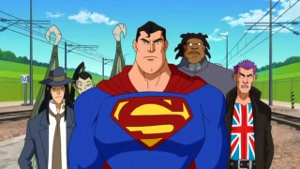
Whenever I get sick of dealing with live action superhero films and the all-but-inevitable disappointment that entails, I look to animation and shout, “Save me.” Specifically Warner Brothers, who’ve looked down and whispered “No,” more times than not. That’s what happens when the marking department dictates what we’ll get, and when. Given there’s a new (live action) Superman movie in production at the time of this writing, here comes the latest animated one, Superman vs. The Elite. Will it rescue us from the crushing mediocrity of things like Justice League: Doom or Batman: Year One? Or will it become what it hates in the name of The Greater Good?
Oh hell, you guys know me, I can’t keep a secret. Not only is it better than Doom and Year One, it’s the second best piece of Superman animation we’ve seen since the cancellation of his last cartoon series…the first being All-Star Superman, of course.
Not that you could tell from the fan reactions. The happy few who stoop to view animated features might be shocked to learn this, but some of my fellow Superfans found All-Star wanting. Few outright hate it, but it’s still a too-short adaption of an twelve issue miniseries, large chunks of which were excised to fit the marketing-mandated 76-minute run time. If you want to “premiere” your film on the Cartoon Network, seventy-six minutes is the perfect length. But as I’ve been saying for five damn years (at this point) arbitrary length restrictions won’t make your film any better. If the WB wanted to do that they’d tell Cartoon Network’s ad-buyers to fuck themselves and make something feature length. It’s not the 40s anymore, guys. You can have a Third Act that isn’t rushed.
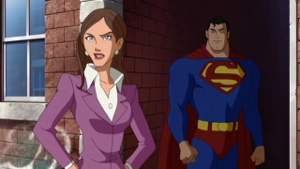
I’m condescending, I know, talking to them like this. But it’s okay, they aren’t listening. Besides, 2009’s Wonder Woman, Public Enemies and Green Lantern: First Flight prove they already know this stuff. Someone does, at any rate. Like those two, Superman vs. The Elite is not a adaption of a best-selling miniseries or a one-shot novel with a howling, drooling fanbase. Instead, it’s an adaption of Action Comics #775 (March, 2001) written by the original writer, Joe Kelly. So already we’re off to a good start. Industry rag Wizard Magazine (the…ahem…Authority…on such things) called Action #775 “the single best issue of a comic book written in the year 2001” and they’re wrong, but who cares? At least it’s a single issue…about ten pages longer than the norm, but that’s to be expected of comic books with issue numbers evenly divisible by 25.
This allowed Kelly (and whomever else stood over his shoulder as he wrote this script) the freedom to expand and elaborate on his original work. It’s still an intelligence-insulting defense of Superman’s ethical code, penned by a comic book writer sick of the draw-out cosmic sagas and ultraviolent X-Men rip-offs he saw around him in 2001 (and 2012, for that matter). But at least it’s a well-made intelligence-insulting defense of Superman’s ethics. Like any good fictional FBI profiler, I can admire craft regardless of the intent behind it.
In many ways, Superman vs. The Elite follows the standard storytelling template from Superman’s post-Death era: a villain who can’t be defeated by simple fisticuffs emerges from the DC Universe, forcing Superman to wrack his brain for an act and half until the inevitable Light Bulb Moment. Thought balloons (ancestor of the modern narration caption) were quintessential storytelling tools in those few years on ether side of Doomsday, and Superman does a lot more thinking than idiots usually give him credit for.
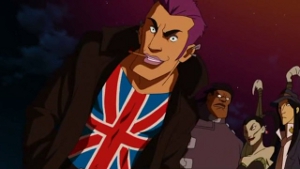
In case you missed the title, our villains this week are a foursome of metahuman vigilantes led by the Union Jack-ed telekinetic Manchester Black (Robin Atkin Downes, who played Solaris the Tyrant Sun in All-Star). We know they’re villains because their Token Girl, Menagerie (Melissa Disney…yes, of the California Disneys) kills a dog moments after her team introduces themselves to the audience. So if you were looking for some nuanced and balanced examination of Superman’s proper place in the twenty-first century, and the proper place for superpowered vigilantes to draw a moral line, go read some books. (Alex Ross and Mark Waid’s Kingdom Come would be a good place to start.)
Besides, just look at ’em. Over-designed upstarts, the whole lot. Amateurs, hovering over the streets like they own the place. Black’s such an arrogant, monologuing wanker, even his teammates call him out on it. (“Only thing that shuts him up is a soccer game.” “Football, you uneducated Yank!”) Their resident magician, The Hat (Andrew Kishino) is an unrepentant drunk and, like all drunks, has only that one trait to define him. Coldcast (Catero Colbert), the team Brick and resident energy sponge/projector, is a big pile of nothing with the movie’s worst lines. (“They have microwave popcorn in your terror-ass country?”) Menagerie’s the team puppy-kicker and develops and instant crush on Supes that pissed me off as much as it did Lois, though for different reasons. Mainly because it’s her only defining trait.
Like most of Superman’s rogues, the Elite are obsessively one-note, and that one note only gets older the more times it’s played. By the end, we’re waiting for Superman (thank you, don’t forget to tip your waitress) to beat them down not because their leader is a lying psychopath who can kill people with his brain, but because a Kryptonian knuckle sandwich looks like the only thing that’ll shut him the fuck up. With him gone, the other (more interesting) members of the team might have space to breathe, maybe get a word in edgewise. We learn Manchester’s backstory, but the other three are consigned to a one-line explanation. It’s a waste of three good power-sets and at least two decent character designs. (Don’t ask me what the fuck’s up with Coldcast.) Which is part of the reason why Kelly spent the last eleven years working (off an on) with these characters.

Thankfully, that decade-plus of experience, combined with the relative freedom of screenplay format, allow Kelly to up-end certain genre expectations. For one thing, he turns the traditional “they-fight-then-team-up” story structure on its head. Superman and the Elite meet over an boarder war between two (safely fictional) countries. Kent’s quick to criticize their lack of concern for collateral damage (pot, meet kettle) but he’s a nice guy at heart, quick to give them the benefit of the doubt. Together, in the film’s best sequence, they save two train’s worth of Chunnel passengers from a terrorist attack, with Supes only balking once Black subjects two prisoners to telekinesis-enhanced interrogation techniques.
It’s a movie-length extention of that scene from The Dark Knight everyone loves,
Brian: What gives you the right? What’s the difference between you and me?
Batman: I’m not wearing hockey pads.
except less-flippant. Because, again, Superman’s more personable than that. Like Batman, his presence warps the world and as time’s gone on he’s grown hyperconscious of his ability to inspire all the wrong people. You want to talk vulnerabilities? The modern Superman’s terribly insecure about how his public perceives him, frequently resorting to that thing he did in Superman Returns where he flies around listening in on what The People are saying. But unlike Batman, Clark’s unwilling to sully that public image, even in the name of some Greater Good. The second he did, Lex Luthor and every other rat bastard like him would pounce faster than a feral cat. “See, you fools? I was right all along! He’s too powerful! You just can’t trust him!”

This story thrives on the idea that maybe…just maybe…the Elite will push Clark to do just that. It almost works now that the WB have grown a pair and let their storytellers use the PG-13 rating to depict some genuinely gruesome things. Onscreen dog-killing is still verbotin, but onscreen people-killing’s a-okay, allowing Superman’s moral stance against it (and attempts to prevent it) actual weight. There are stakes to his conflict and a proper build up to the Climactic Battle, creating tension by setting up expectations of defeat, both in us the audience and in Superman himself. There’s a moment where Jonathan Kent (Paul “I’ve been a voice actor since the original Transformers cartoon” Eiding) – and I love Paul Eiding’s version of Jonathan Kent – assures his son, “if those knuckleheads don’t quit tugging on your cape, you can always kick their self-righteous asses to kingdom come.” Clark’s interrupted by a phone call before he can answer – Atomic Skull’s escaped again. But there’s just enough of a pregnant pause to see the wheels turning in Our Hero’s head.
Clark’s ultimate solution to all this is an improvement over its source story, which felt rushed. With time to decompress, important scenes can occur onscreen, the scope of Superman’s world can become apparent, and we even have time for quiet scenes where Lois (Pauley Perrette, the second NCIS alum to appear in these films) and Clark (George Newbern, reprising his role from the Justice League TV series) can (gasp) sit around and (shock) actually talk to each other. Ya know, like couples do.
Uninitiated rubes, take heed: this is the Lois and Clark I grew up with. Screw that pair of TV actors and their drawn-out, prime time soap opera. These two – the hayseed writer out to save the world and the cynical city gal with the poor spelling habits who loves him – are the emotional core of modern Superman comics. Having tried everything else – i.e., every possible flavor of love triangle – Clark’s writers and editors at last gave in and allowed the two to marry in 1996. Even before that, during their “living in sin” period, their relationship had already reached a point where they could at last have civilized discussions with each other, free of the little white lies that peppered Clark’s conversations for far too long. It made Lois look like a fool and it made him look like an asshole.
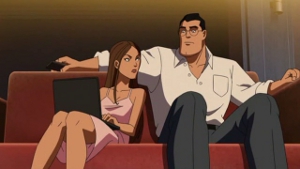
Here and now, the two are a formidable force, practicing a breed of gonzo journalism that would drive even the weirdest pro to drink. Newbern’s as good here as he was in the series, speaking from the back of his throat while pushing just enough through his nose to lend himself a Midwestern flavor. Pauley Perrette’s Lois sounds younger and quicker to anger than Dana Delany’s, but for whatever reason, Delany’s chosen to stick it out on Desperate Housewives. Perette gets more to do than Christina Hendricks did, and better dialogue besides. Her exchanges with Newbern-as-Clark are the (intentionally) funniest bits in the movie:
Lois: Clark, I called Kansas and Ma said you’re not there. So pick up your stupid hologram thingy or I’ll kick your butt when you get home.
Superman [picking up the Fortress of Solitude’s “hologram thingy”]: Sweet-talker.
I could watch a movie’s worth of this all by itself. Absent the members of his superhero community, Clark’s free to do what he’s been doing in comics for decades: figure shit out on his own. No, he isn’t a detective, but he is a reporter, goddamnit, with the good sense to marry another reporter who’s even better at it than he is (despite her slower typing speed and flagrant spelling errors). That still means something in contexts as fictional as this: it means Superman can finaly be the active protagonist of his own damn movie. (Are you seeing this, Bryan Singer? No, you’re not. Never mind. You had your chance and blew it.)

Thanks to that, Superman vs. The Elite crosses that invisible line into “Good.” Everything else – the smooth animation, the good direction from Michael (Teen Titans, Batman: The Brave and the Bold and Young Justice) Chang, the blood, even the Villainous Monologing – win it that extra half-G. It’s not the grand epic that was All-Star Superman, but it doesn’t have to be. All it had to do was be a good Superman story, and it is. Not the first Superman story (we comic fans have endured nearly ten years of those by now, thank you very much) or the last, but a story from the vast middle period when no one really pays attention to him, apart from fans on either side of the professional divide. So from all of us here out in the cold, I congratulate all of you still trapped in the corporate hive. You smuggled this one past the gatekeepers and it came out in real good shape. This was a test of your imagination, and you passed.
![]()
![]()
![]()
![]()
Addendum: The fact that Superman stoops to say the word “wankers” (because ‘Chester Black said it first) has caused no small amount of consternation among my fellow fans in the UK, out of the misguided belief that “SUPERMAN SHOULD NEVER SWEAR!” Which itself flows from the even-more misguided belief that Superman is something other than human. Sorry guys, but you’re getting your pants twisted for all the wrong reasons. No matter what his genetic code looks like, the boy was raised in Kansas…and have you ever met a Kansan? Nice people, once you get to know them, and I know these people in my goddamn blood! They’re out there wondering what keeps Superman from cursing blue streaks every day of his life. The things he faces would strain even the heartiest sailor’s vocabulary. Besides, most of my fellow uneducated Yanks don’t even know what that word means. Though hopefully their children will now.
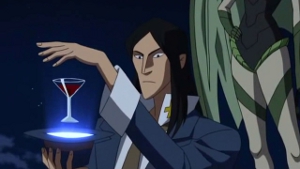

I was surprised as how good this one was, I think I like it the best of the Superman animated films. All-Star Superman was good, but stumbled with a couple of distractions to the plot that make parts feel like individual cartoon episodes sewn together (which were legacies of the original story arc, IIRC) and Elite seems more of a singular story, though it has a bit of muddling in the middle that keeps it from being perfect. I also think this should have been the film that Superman Returns was.
They were legacies of the original comic, half-done story arcs that are mutual bones of contention for comic and movie fans. I would’ve watched the hell out of Returns if it were at all like this. It might’ve been just the “Superman (Re)Begins” the WB went looking for when they stole Bryan Singer from the X-franchise. Too bad Singer’s probably read even fewer comic books than Tim Burton.